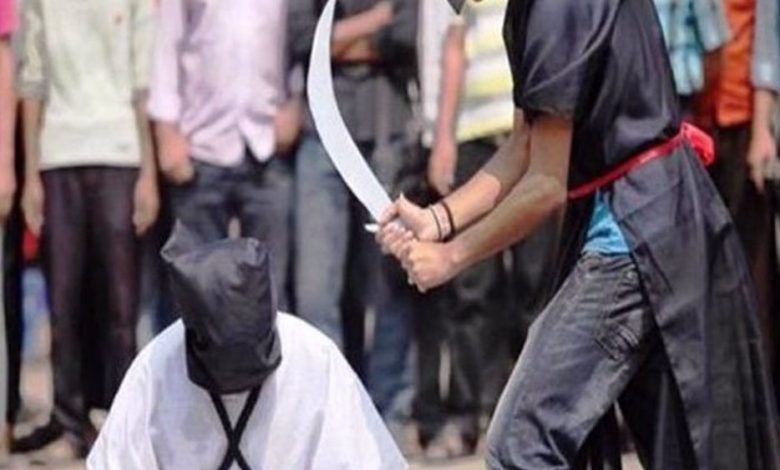Opposition bloc, Iraqi PMU strongly condemn mass executions by Slaughterer Saudi regime
Execution of over 80 prisoners in a single day in Saudi Arabia has drawn a strong wave of condemnation from various Islamic and Saudi opposition groups, which say most of those executed had been jailed only for exercising their right to free expression of opinion.

In a statement on Saturday, the Arabian Peninsula Opposition bloc, which is an umbrella for Saudi dissidents, strongly blasted the kingdom’s executing as many as 81 prisoners in a single day over so-called “terror-related offenses,” in the largest mass execution carried out by the highly-conservative Arab kingdom in recent memory.
The latest executions by Saudi authorities in one day exceeded the total number of executions conducted in the Arab kingdom throughout 2021.
The bloc noted that 41 of the executed prisoners, belonged to the peaceful al-Hirak al-Janoubi movement and hailed from the Shia-populated al-Ahsa and Qatif regions in the kingdom’s Eastern Province.
The bloc of Saudi dissidents called the kingdom’s de facto ruler Mohammed bin Salman “nothing more than a murderer, who enjoys shedding the blood of the innocent,” saying the mass execution was carried out against young people, who had exercised their right to express their opinion and had been imprisoned as a result.
The bloc added that the ruling Al Saud regime has once more proved to the world that it is a “murderous and savage” regime, adding that the mass execution proved that all of bin Salman’s claims of seeking to introduce reforms are nothing more than “empty propaganda.”
In a related development, Abu Ala al-Walai, the secretary of Kata’ib Sayyid al-Shuhada, which is a subdivision of Iraq’s Popular Mobilization Units (PMU) or Hashd al-Sha’abi anti-terror force, said the Saudi regime went ahead with the execution after finding the world busy with the Russia-Ukraine conflict.
“Through these executions, the Saudi regime has proven its sectarian nature, the Iraqi PMU official said.
Nasr al-Shammari, the official spokesman of al-Nujaba Islamic Resistance Movement, another PMU subgroup, said, “Saudi Arabia continues its violation of human rights through the executions and seeks to mislead [the public] by accusing the Shia dissidents of terrorism.”
Iraq’s Islamic Dawa Party (Hizb ad-Da’wa al-Islamiyya or the Islamic Call Party), for its part, strongly condemned Saudi execution of a group of citizens from the kingdom’s Shia-dominated Qatif region in the Eastern Province.
The Iraqi party noted that mass executions were carried out within framework of Saudi government’s state terrorism against its own civilians and belied Saudi rulers’ claims about reforms in the country and the existence of an open political atmosphere.
Meanwhile, Qais Khazali, secretary-general of Iraqi resistance movement Asa’ib Ahl al-Haq, said for his part that the Al Saudi regime continues to insist on carrying out atrocities that are in violation of the most basic Islamic regulations.
In a related development, Yemeni Information Minister Dhaifullah al-Shami said the victims of Saudi mass executions included seven Yemenis and 41 citizens of the kingdom’s Shia-dominated Qatif region, calling the mass execution “a crime against humanity.”
The Yemeni official noted that such crimes are carried out with the United States’ green light, and prove the bogus nature of the American democracy.
The Yemeni government’s National Committee for Prisoners Affairs also reacted to Saudi mass executions, saying there were a number of Yemeni prisoners among those executed, who actually fell victim to Saudi Arabia’s hostility against the Yemeni people.
The committee noted that the measure taken by the Saudi regime contravenes all norms of international law and covenants, warning Riyadh that the execution of Yemeni prisoners will have severe consequences for the regime.
The kingdom’s last mass execution occurred in early January 2016, when Saudi authorities executed 47 people, including prominent Shia cleric Sheikh Nimr Baqir al-Nimr, who had vociferously called for democracy in the kingdom and advocated anti-regime protests. Nimr had been arrested in Qatif, Eastern Province, in 2012.
Since 2015, Saudi Arabia has reportedly executed more than 900 prisoners in an increasing rate. In 2019 alone, Saudi Arabia set a record number of executions after Saudi authorities executed 184 people, despite a general decrease in the number of executions around the world.
In April 2020, Reprieve, a UK-based non-profit organization, said Saudi Arabia had carried out its 800th execution. The report added that executions had almost doubled in only five years in comparison with the 423 executions conducted in Saudi Arabia from 2009 through 2014.
Saudi- Arabia’s Eastern Province, which is largely populated by the Shia minority, has been the scene of peaceful demonstrations since February 2011. Protesters have been demanding reforms, freedom of expression, release of political prisoners, and an end to economic and religious discrimination against the oil-rich region. The protests have met with a heavy-handed crackdown by the regime.
Over the past years, Riyadh has also redefined its anti-terrorism laws to target activism.







